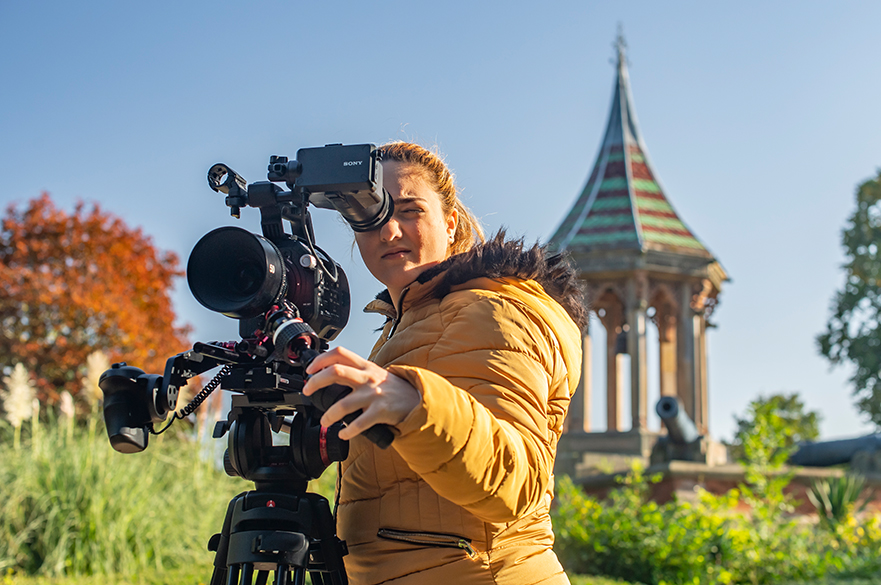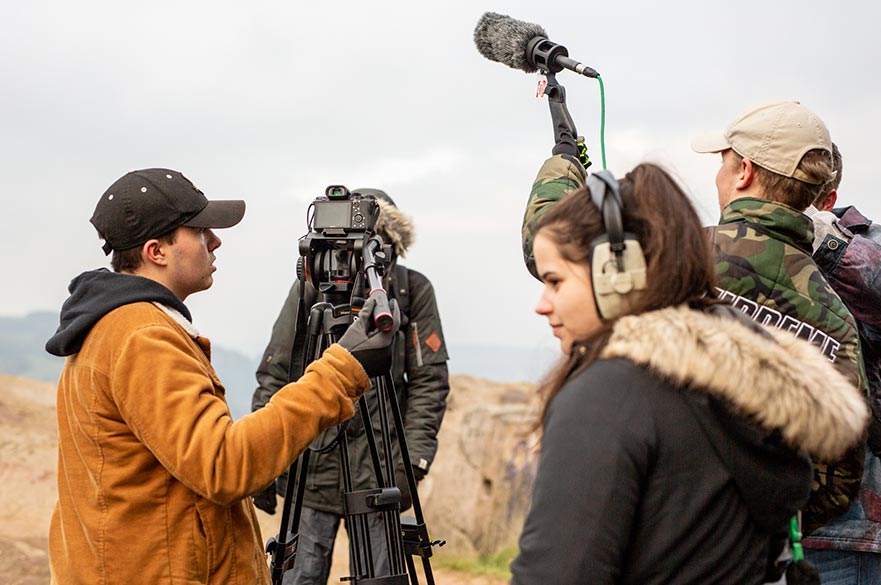Beat the Clearing queue
About this course
Throughout this Film Production foundation degree you’ll learn the skills needed to work in a variety of technical roles within the film production process. You’ll get a wide range of experience whilst developing a specific area of expertise and developing a strong portfolio of work, tailored to your career aspirations.
From ideation and pre-production to post-production and the final exhibition of films, you’ll be immersed in every aspect of the filmmaking process.
Develop expertise in camera operation, lighting techniques, editing, colour grading, audio recording, and sound design, while building a portfolio showcasing your industry experience.
15
What you’ll study
Throughout this film production degree you’ll learn the skills needed to work in a variety of technical roles within the film production process. You can also expect to gather a wide range of experience whilst developing a specific area of expertise and develop a strong portfolio of work, tailored to your career aspirations.
You'll have the chance to study the broadest range of disciplines including:
- cinematography
- audio and visual post-production
- short film production
- genre study
- chroma key technology
- colour grading
- lighting
- audio acquisition
Audio-Visual Film Technologies (20 credit points)
This module introduces students to a range of equipment used on a film set. You will develop the skills and understanding required for camera operation, audio acquisition and lighting techniques for film. You will examine the scientific principles behind the practical skills that inform the filmmaker's ability to achieve a cinematic quality product when using lighting, audio and camera technologies.
The Evolution of Film Technology (20 credit points)
Throughout this module you will study the historical development of film technology and assess the impact technological change has had on the industry. You will be given the opportunity to investigate a range of film examples, past and present, in order to assess the impact technology has had and continues to have on changes in film production, distribution and access.
Applied Film Technologies (20 credit points)
During this module you will be expected to work collaboratively as a part of a production team on a film set. As part of the production team it is expected that students will demonstrate proficiency working with a particular piece of hardware in a particular discipline. Through self-reflection and evaluation you will also need to demonstrate a detailed understanding of the camera, lighting and audio technologies applied to their production.
Post-Production Technology for Film (20 credit points)
Throughout this module you will learn how to use post production software for both visual and audio. You will develop an understanding of the technologies involved and its impact on the creative process. You will gain experience within the workflow of the technologies and understand the interrelationships between software's, developing skills that will enable you to implement post production theory in a practical way with a varied pool of resources.
Script to Screen (40 credit points)
This module aims to equip you with the abilities needed to proficiently oversee a film production, guiding it from conception to public showing. You'll take a film concept and navigate through all the essential phases, harnessing film production technology for shooting and editing. Alongside refining your screenwriting skills, you'll also enhance your technical expertise, all while collaborating within a team. Teamwork is integral to crafting a film of exceptional quality that meets high standards.
Advanced Film Technologies (20 credit points)
This module introduces you to the technical specifications and requirements of a range of complex film grip equipment. You will learn to operate the equipment whilst also investigating the scientific principles surrounding camera and lighting technologies when shooting for visual effects content. You will then be required to plan and shoot a technically complex sequence using appropriate specialist equipment.
Short Film Development (20 credit points)
This module will require you to independently study the short film genre. You will be expected to research appropriate markets to inform the development and production of their own short film to be entered into a relevant and well justified short film competition. Working under the guidance of an industry partner, you will undertake the pre-production, of your own short film, ensuring that the correct health and safety regulations are fully considered.
Short Film Production (20 credit points)
During this module you will be expected to independently produce a short film aimed at a film festival or short film competition. You will be expected to demonstrate the ability to work in appropriate film production environments working to the necessary health and safety regulations. You will independently undertake production management of the workflow, processes and professional practice in the successful delivery of your own short film.
Film Industry Practice (20 credit points)
During this module you will undertake appropriate work based learning allowing you to directly apply the knowledge and skills learnt throughout the course in the context of the workplace. In order to develop their understanding of the employment market you will learn about working in the film industry from both an employment and self-employment perspective.
You will learn how to operate as a freelancer and how to set-up, operate, run and promote a production company. The module will develop entrepreneurial skills and you will develop a range of self-promotional material to help you prepare for entering the film industry.
Advanced Post-Production Technology for Film (20 credit points)
Within this module you will develop more advanced skills in the areas of post production for film. This will involve visual effects, colour correction and picture grading for film post production; and dubbing, mixing, ADR and Foley for audio post production.
You will also learn how to deliver content for distribution for cinema using the correct technical procedures. Using the knowledge, understanding and skills acquired in these module you will work with an industry partner or client to post produce a product to be shown in the cinema.
Non-Fiction Filmmaking (20 credit points)
In this module, you'll learn how to create engaging non-fiction films. You'll explore both the theory behind effective storytelling and the practical aspects of making these films. Through hands-on projects, you'll choose a topic that interests you and develop your skills in researching, scripting, filming, and editing.
Collaborating with classmates will give you a taste of real-world teamwork in the film industry. By the end, you'll have the tools to craft compelling non-fiction stories that resonate with audiences.
We regularly review and update our course content based on student and employer feedback, ensuring that all of our courses remain current and relevant. This may result in changes to module content or module availability in future years.
How you're taught
Teaching and learning experiences will include:
- lectures
- seminars
- group tutorials
- academic tutorials
- workshops
- presentations and pitches
- visiting industry professionals
- team working
- independent study
Showcase
You will be given the opportunity to exhibit your work during your time at NTU to members of the creative industries.
How you're assessed
There is a varied range of assessment methods throughout the course, which includes:
- film production development work
- film productions
- research tasks
- case studies
- portfolio work
- reports and evaluations
- lab reports
- essays
- visual and verbal presentations
Careers and employability
After completing your foundation degree, you’ll have the chance to top up to BSc (Hons) Film Production or go straight into industry.
Employability is a key focus of this course, with modules including initiatives, such as live projects and the opportunity to exhibit your work, to help enhance your future career.
This course will prepare you to work in creative industries in specialist technical roles, in areas such as feature films, television, and advertising.
You will also develop transferable skills for alternative careers in teaching, retailing, media, and freelance design.
Previous students are working at companies, such as:
- Pinewood Studios
- Spool Films
- The Football Association
- UEFA
- Plum Pictures.
Connecting with industry
Industry professionals will visit the course to guest lecture and share their experiences. Live projects will help you to gain real experience of the industry, make contacts and build your portfolio and CV.
YouFirst – working with our Employability Team
Studying a degree at a popular university has many benefits, none more so than having access to a large employability team.
Our friendly, experienced careers consultants will work closely with you at every stage of your career planning, providing personal support and advice you won't find in a book or on the internet. You can benefit from this at any time during your studies and up to three years after completing your course.
Campus and facilities
On this course you’ll study in our £9.1million Digital Media Hub. You’ll have access to:
- A range of cameras such as Blackmagic Pocket Cinema Camera, Sony FS5, Blackmagic Ursa Mini, DJI Ronin RS3 Pro gimbal and DJI Ronin 2 Gimbal
- Industry-standard software, such as Avid Media Composer, Adobe Premiere, and DaVinci Resolve Studio
- A 25 seat screening room
- A 37m2 Green Screen VFX studio with VFX infinity curve screen
- A 144m2 studio space with industry-standard digital video cameras and full lighting rig
- Industry spec production gallery with 4k production facilities
- Foley suite
- Production and meeting rooms
- Access to audio post-production equipment.
Entry requirements
UK students
- 64 UCAS Tariff points; and
- GCSE - English and Maths Grade C / 4
Additional requirements for UK students
There are no additional requirements for this course.
Other qualifications and experience
NTU welcomes applications from students with non-standard qualifications and learning backgrounds, either for year one entry or for advanced standing beyond the start of a course into year 2 or beyond.
We consider study and/or credit achieved from a similar course at another institution (otherwise known as credit transfer), vocational and professional qualifications, and broader work or life experience.
Our Recognition of Prior Learning and Credit Transfer Policy outlines the process and options available for this route. If you wish to apply via Recognition of Prior Learning, please contact the central Admissions and Enquiries Team who will be able to support you through the process.
Getting in touch
If you need more help or information, get in touch through our enquiry form.
International students
This course is not suitable for International applicants.
Additional requirements for international students
There are no additional requirements for this course.
English language requirements
View our English language requirements for all courses, including alternative English language tests and country qualifications accepted by the University.
If you need help achieving the language requirements, we offer a Pre-Sessional English for Academic Purposes course on our City campus which is an intensive preparation course for academic study at NTU.
Other qualifications and experience
If you have the right level of qualifications, you may be able to start your Bachelors degree at NTU in year 2 or year 3. This is called ‘advanced standing’ entry and is decided on a case-by case basis after our assessment of your qualifications and experience.
You can view our Recognition of Prior Learning and Credit Transfer Policy which outlines the process and options available, such as recognising experiential learning and credit transfer.
Sign up for emails
Sign up to receive regular emails from the International Office. You'll hear about our news, scholarships and any upcoming events in your country with our expert regional teams.
Getting in touch
If you need advice about studying at NTU as an international student or how to apply, our international webpages are a great place to start. If you have any questions about your study options, your international qualifications, experience, grades or other results, please get in touch through our enquiry form. Our international teams are highly experienced in answering queries from students all over the world.
Policies
We strive to make our admissions procedures as fair and clear as possible. To find out more about how we make offers, visit our admissions policies page.









